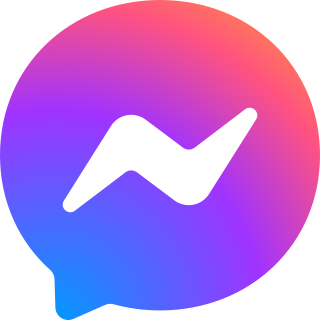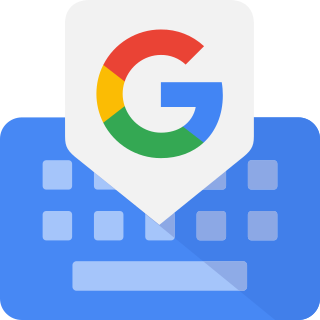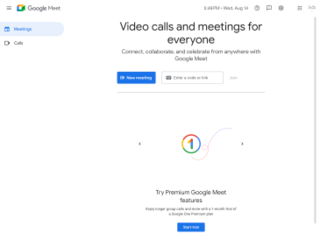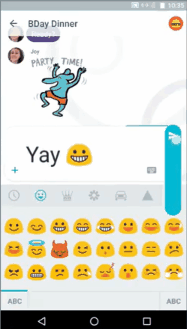
Gmail is the email service provided by Google. As of 2019, it had 1.5 billion active users worldwide, making it the largest email service in the world. It also provides a webmail interface, accessible through a web browser, and is also accessible through the official mobile application. Google also supports the use of third-party email clients via the POP and IMAP protocols.

Google Calendar is a time-management and scheduling calendar service developed by Google. It was created by Mike Samuel as part of his 20% project at Google. It became available in beta release April 13, 2006, and in general release in July 2009, on the web and as mobile apps for the Android and iOS platforms.

Rich Communication Services (RCS) is a communication protocol standard between mobile telephone carriers, based on IP Multimedia Subsystem, developed and defined by the GSM Association (GSMA). It aims to be a replacement of SMS and MMS, with a text-message system that is richer and provides phonebook polling. It is also marketed as Advanced Messaging, and was previously marketed as chat features, joyn, SMSoIP, Message+, and SMS+.

Messenger, also known as Facebook Messenger, is an American proprietary instant messaging app and platform developed by Meta Platforms. Originally developed as Facebook Chat in 2008, the company revamped its messaging service in 2010, released standalone iOS and Android apps in 2011, and released standalone Facebook Portal hardware for Messenger calling in 2018. In April 2015, Facebook launched a dedicated website interface, Messenger.com, and separated the messaging functionality from the main Facebook app, allowing users to use the web interface or download one of the standalone apps. In April 2020, Facebook released a Messenger desktop app for Windows and macOS.

Line is a freeware app for instant communications, developed by Naver. Line users exchange: texts, images, video and audio and conduct free VoIP conversations and video conferences. In addition, Line is a platform providing services including digital wallet as Line Pay, news stream as LINE Today, video on demand as Line TV and digital comic distribution as Line Manga and Line Webtoon. South Korea’s Naver developed the messaging software Line.
Snapchat is an American multimedia instant messaging app and service developed by Snap Inc., originally Snapchat Inc. One of the principal features of Snapchat is that pictures and messages are usually only available for a short time before they become inaccessible to their recipients. The app has evolved from originally focusing on person-to-person photo sharing to presently featuring users' "Stories" of 24 hours of chronological content, along with "Discover", letting brands show ad-supported short-form content. It also allows users to store photos in a password-protected area called "My Eyes Only". It has also reportedly incorporated limited use of end-to-end encryption, with plans to broaden its use in the future.

Google Hangouts was a cross-platform instant messaging service developed by Google. It originally was a feature of Google+, becoming a standalone product in 2013, when Google also began integrating features from Google+ Messenger and Google Talk into Hangouts. Google then began integrating features of Google Voice, its Internet telephony product, into Hangouts, stating that Hangouts was designed to be "the future" of Voice.

Telegram Messenger, commonly known as Telegram, is a cloud-based, cross-platform, instant messaging (IM) service. It was originally launched for iOS on 14 August 2013 and Android on 20 October 2013. It allows users to exchange messages, share media and files, and hold private and group voice or video calls as well as public livestreams. It is available for Android, iOS, Windows, macOS, Linux, and web browsers. Telegram also offers end-to-end encryption in voice and video calls, and in optional private chats, which Telegram calls Secret Chats.

Inbox by Gmail was an email service developed by Google. Announced on a limited invitation-only basis on October 22, 2014, it was officially released to the public on May 28, 2015. Inbox was shut down by Google on April 2, 2019.
Android Marshmallow is the sixth major version of the Android operating system developed by Google, being the successor to Android Lollipop. It was announced at Google I/O on May 28, 2015, and released the same day as a beta, before being officially released on September 29, 2015. It was succeeded by Android Nougat on August 22, 2016.

Android Nougat is the seventh major version and 14th original version of the Android operating system. First released as an alpha test version on March 9, 2016, it was officially released on August 22, 2016, with Nexus devices being the first to receive the update.

Gboard is a virtual keyboard app developed by Google for Android and iOS devices. It was first released on iOS in May 2016, followed by a release on Android in December 2016, debuting as a major update to the already-established Google Keyboard app on Android.

The Google Assistant is a virtual assistant software application developed by Google that is primarily available on mobile and home automation devices. Based on artificial intelligence, The Google Assistant can engage in two-way conversations, unlike the company's previous virtual assistant, Google Now.
Google Duo was a proprietary voice over IP (VoIP) and videotelephony service released in 2016 by Google and merged into its Google Meet product in 2022. It was available for Android, IOS and web browsers. It let users make and receive one-to-one and group audio and video calls with other Duo users in high definition, using end-to-end encryption by default. Duo could be used either with a phone number or a Google account, allowing users to call someone from their contact list.
The Signal Protocol is a non-federated cryptographic protocol that provides end-to-end encryption for voice and instant messaging conversations. The protocol was developed by Open Whisper Systems in 2013 and was introduced in the open-source TextSecure app, which later became Signal. Several closed-source applications have implemented the protocol, such as WhatsApp, which is said to encrypt the conversations of "more than a billion people worldwide" or Google who provides end-to-end encryption by default to all RCS-based conversations between users of their Google Messages app for one-to-one conversations. Facebook Messenger also say they offer the protocol for optional Secret Conversations, as does Skype for its Private Conversations.
The following is a timeline of WhatsApp, a proprietary cross-platform, encrypted, instant messaging client for smartphones.

Google Meet is a video communication service developed by Google. It is one of two apps that constitute the replacement for Google Hangouts, the other being Google Chat. It replaced the consumer-facing Google Duo on November 1, 2022, with the Duo mobile app being renamed Meet and the original Meet app set to be phased out.

Google Chat is a communication service developed by Google. Initially designed for teams and business environments, it has since been made available for general consumers. It provides direct messaging, group conversations, and spaces, which allow users to create and assign tasks and share files in a central place in addition to chatting. It can be accessed through its own website and app or through the Gmail website and app.

Google Messages is a text messaging software application developed by Google for its Android and Wear OS mobile operating systems, while it's also available via the Web.
Comparison of user features of messaging platforms refers to a comparison of all the various user features of various electronic instant messaging platforms. This includes a wide variety of resources; it includes standalone apps, platforms within websites, computer software, and various internal functions available on specific devices, such as iMessage for iPhones.














